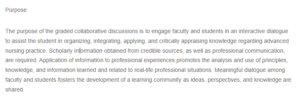Advancing Holistic Care in Opioid Use Disorder- Leadership, Person-Centered Strategies, and Scholarly Engagement in Advanced Nursing Practice
Person-centered care refers to the provision of health care services that fulfill the needs of patients. This type of care requires the nurses to work in concert with patients and identify their preferences and beliefs (Kwame & Petrucka, 2021). This feedback forms the basis for making key clinical decisions, including the treatment plan and nutrition. Good communication skills are the best way to create rapport and promote person-centered care (Kwame & Petrucka, 2021). Nursing personnel should uphold desirable verbal and nonverbal cues during their interaction with patients. Good skills that involve active listening, paraphrasing, and proper turn-taking are important. These skills facilitate an accurate reporting of presenting complaints, history, and preferences.
Holistic nursing care entails managing the person as a whole. It ensures that all patient’s needs are addressed. The nature of the needs is diverse: economic, cultural, social, spiritual, physical, and emotional (Hajbaghery, 2018). Holistic care promotes a better understanding of a patient and increases their satisfaction with nursing care. I will apply the principles of holistic care in my future nursing practice. To achieve this, I will aim to create rapport through open communication. Subsequently, this will enable me to have an intricate understanding of the patients. Based on the feedback, I will utilize pharmacological and nonpharmacologic approaches to manage patients. Techniques such as aromatherapy and hydrotherapy can fulfill patients’ desires.
Holistic care will enable me to uphold cultural humility. A patient’s way of life should be respected. Patients should be respected regardless of their different perceptions of their health and wellness. Accordingly, I will embrace critical thinking, communication skills, and tolerance to maintain cultural humility (Hughes et al., 2020). Self-reflection will enable me to identify my beliefs and approach to healthcare versus patients’ perceptions (Chen et al., 2019). It will also enable me to identify mistakes and address them. Furthermore, I will acknowledge my strengths and work to embolden them. Finally, self-reflection will improve my professional practice and promote the realization of holistic nursing care.
References
Chen, F. F., Chen, S. Y., & Pai, H. C. (2019). Self-Reflection and Critical Thinking: The Influence of Professional Qualifications on Registered Nurses. Contemporary Nurse, 0(0), 1–22. https://doi.org/10.1080/10376178.2019.1590154
Hajbaghery, M. A. (2018). Complementary and Alternative Medicine and Holistic Nursing Care: The Necessity for Curriculum Revision. Journal of Complementary Medicine & Alternative Healthcare, 5(4), 13–14. https://doi.org/10.19080/jcmah.2018.05.555666
Hughes, V., Delva, S., Nkimbeng, M., Spaulding, E., Turkson-Ocran, R. A., Cudjoe, J., Ford, A., Rushton, C., D’Aoust, R., & Han, H. R. (2020). Not Missing the Opportunity: Strategies to Promote Cultural Humility Among Future Nursing Faculty. Journal of Professional Nursing, 36(1), 28–33. https://doi.org/10.1016/j.profnurs.2019.06.005
Kwame, A., & Petrucka, P. M. (2021). A Literature-Based Study of Patient-Centered Care and Communication in Nurse-Patient Interactions: Barriers, Facilitators, and the Way Forward. BMC Nursing, 20(1), 1–10. https://doi.org/10.1186/s12912-021-00684-2
ORDER A PLAGIARISM-FREE PAPER HERE
We’ll write everything from scratch
Question
Week 3: Person-Centred Care
No unread replies.No replies.
Purpose
The purpose of the graded collaborative discussions is to engage faculty and students in an interactive dialogue to assist the student in organizing, integrating, applying, and critically appraising knowledge regarding advanced nursing practice. Scholarly information obtained from credible sources, as well as professional communication, are required. Application of information to professional experiences promotes the analysis and use of principles, knowledge, and information learned and related to real-life professional situations. Meaningful dialogue among faculty and students fosters the development of a learning community as ideas, perspectives, and knowledge are shared.

Advancing Holistic Care in Opioid Use Disorder- Leadership, Person-Centered Strategies, and Scholarly Engagement in Advanced Nursing Practice
Activity Learning Outcomes
Through this discussion, the student will demonstrate the ability to:
Examine roles and competencies of advanced practice nurses essential to performing as leaders and advocates of holistic, safe, and quality care (CO1)
Apply concepts of person-centered care to nursing practice situations (CO2)
Analyze essential skills needed to lead within the context of complex systems (CO3)
Explore the process of scholarship engagement to improve health and healthcare outcomes in various settings (CO4)

